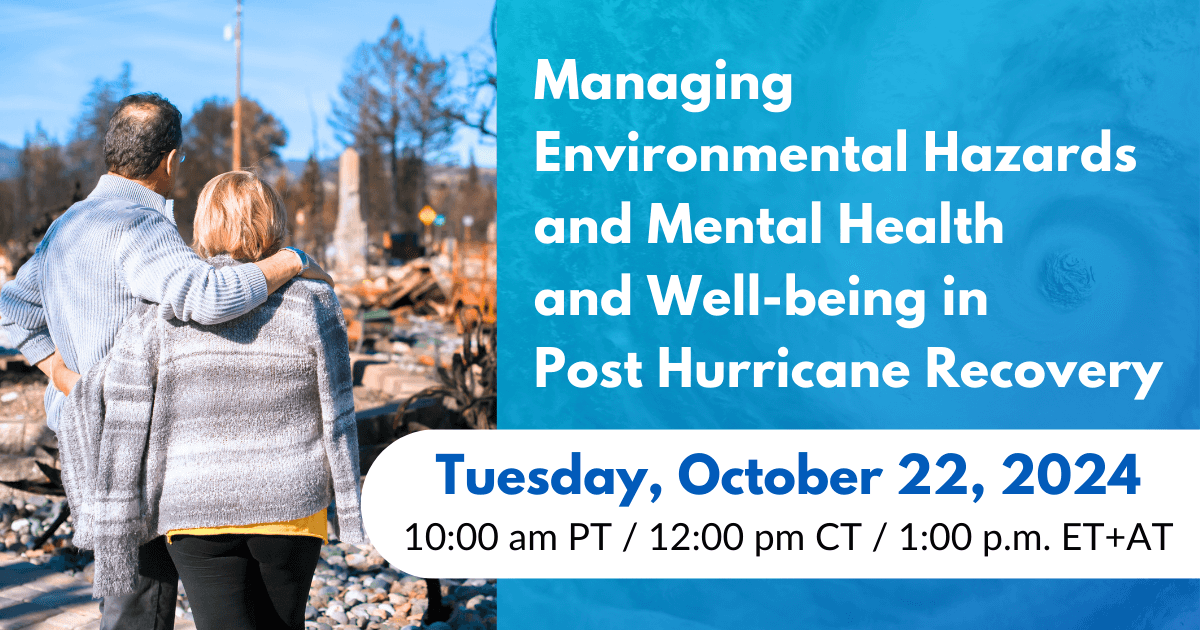
Join us for a webinar focused on equipping workers, volunteers, and community members with the necessary tools to manage environmental, occupational, and mental health risks during the recovery phase following a hurricane. During this seminar, different strategies will be discussed to protect from hazards commonly encountered post-hurricane, such as heat exposure, mold, mildew, and vector-borne diseases. We will also discuss the impact on emotional and psychological health of those who are on the ground. Approaches to fostering resilience and maintaining well-being for both workers and survivors will also be shared.
Watch the Webinar Recording
Download the Presentation Slides
Take the Evaluation
At the conclusion of this presentation, participants will be able to…
- Learn about common hazards during the recovery phase following a hurricane and how they affect workers, volunteers, and community members responding to the emergency.
- Identify the effects of these hazards on the health and well-being of emergency responders.
- Explore resources to help responders better protect their health and safety during emergency management.
- Identify and distinguish between different types of stress, including their causes and impacts on well-being.
- Explore practical self-care strategies to effectively manage and cope with stress in daily life.
Disclaimer: The materials presented in this webinar were partially developed with the support of the National Institute of Environmental Health Sciences of the National Institutes of Health under Award Number U45ES006179. The content is solely the responsibility of the authors and does not necessarily represent the official views of the National Institutes of Health.
Presenters

Marysel
Pagán Santana
DrPH, MS
Director of Environmental and Occupational Health, Senior Program Manager for Puerto Rico
Migrant Clinicians Network
Marysel Pagán Santana, DrPH, MS, serves as Director of Environmental and Occupational Health of Migrant Clinicians Network in Puerto Rico, where she leads and coordinates MCN projects related to the climate crisis, occupational health, and emergency response. She is also the organization's lead for the Caribbean Office. Dr. Pagán Santana provides technical assistance, training, and tool development for community health centers in Puerto Rico and the communities they serve to address disaster-related issues and health-related impacts. Additionally, she is the project director of a USDA-funded project to support resiliency among farmworkers in Puerto Rico and the US Virgin Islands. She also provides training related to occupational health and safety to different populations of workers in Puerto Rico. Dr. Pagán Santana has extensive experience providing training to vulnerable and high-risk worker populations and carrying out community projects. She also has over eight years of experience in the private sector as an industrial hygienist and continues to offer them her professional consulting in the development and implementation of training programs in occupational and environmental health, emergency preparedness, and business continuity planning. In recent years, Dr. Pagán Santana has focused on assisting the response to COVID-19 in educational institutions in Puerto Rico, as well as supporting the PR Department of Health's response by offering training to personnel responsible for monitoring schools and businesses to promote the health of students and essential personnel in Puerto Rico. Dr. Pagán Santana has a Master’s degree in Industrial Hygiene and a Doctorate in Public Health with an emphasis on environmental health from the Medical Sciences Campus of the University of Puerto Rico.

Pamela
Secada-Sayles
MPH
Senior Program Manager, Mental Health and Well-Being
Migrant Clinicians Network
Pamela Secada-Sayles, MPH (she/her/ella) is a Peruvian immigrant with ancestral roots to the people of present-day China, Spain, and Italy. She received her Master's in Public Health: Healthcare Policy and Management at University of California, Los Angeles and her Bachelor’s in Anthropology and Chicana/o Studies from California State University, Fullerton. She is currently a doctoral candidate in the Doctor of Education, Organizational Change and Leadership program at the University of Southern California. Her dissertation focus is on examining organizational and leadership practices that have impacted employee wellbeing during the COVID-19 pandemic. Secada-Sayles is passionate about advancing health equity and eliminating health disparities. Her professional career has focused on a wide range of health issues including substance use interventions, review of cultural competency curriculum, community health worker training, and health workforce diversity through educational equity. Secada-Sayles lives in Los Angeles, California with her partner, two stepsons, and their rescue Pitbull, Rocco. When she is not at work or school, she enjoys excessive amounts of sleep, supporting her local dog rescues, watching true crime shows, embarking on new culinary adventures in Los Angeles, laughing, and spending time with her family and friends.